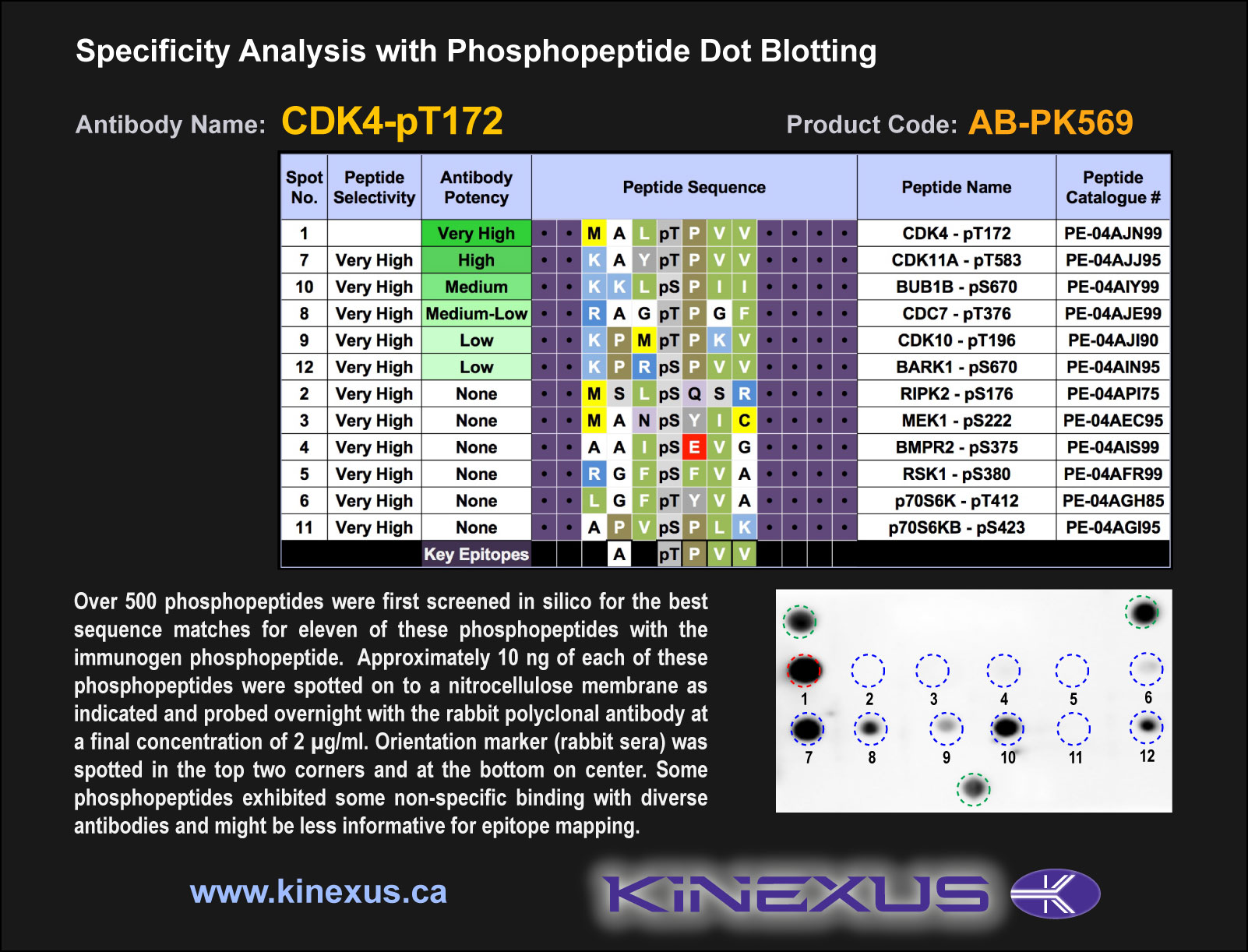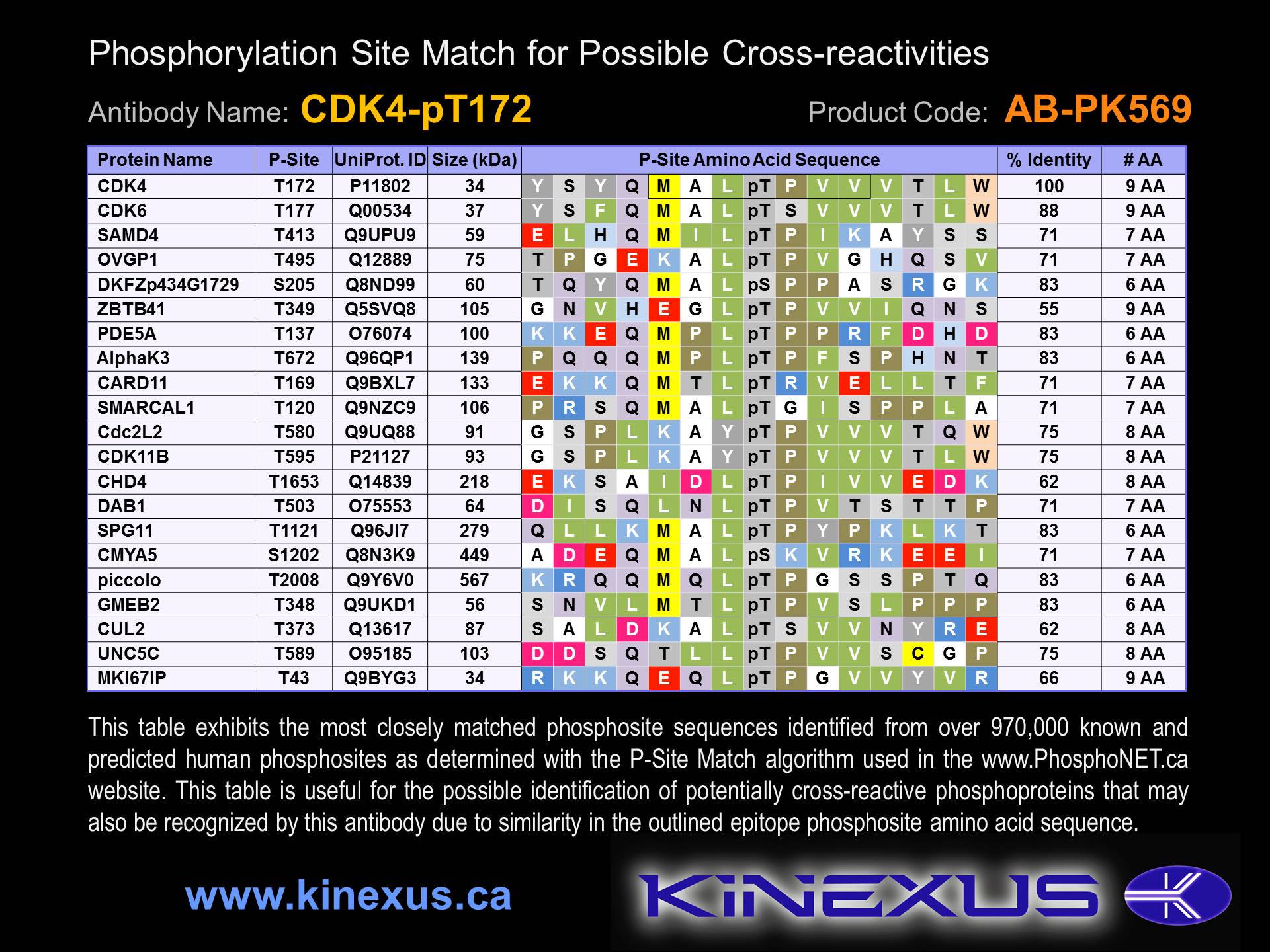Product Name: CDK4-pT172
Product Number: AB-PK569
| Size: | 25 µg | Price: | 89.00 | |
| $US |
Target Full Name: Cyclin-dependent protein-serine kinase 4
Target Alias: CRK3; Cyclin-dependent kinase 4; Kinase CDK4; PSK-J3; CMM3; MGC14458; CCDS8953.1; ENSG00000135446
Product Type Specific: Protein kinase phosphosite-specific antibody
Antibody Code: PK569
Antibody Target Type: Phosphosite-specific
Antibody Phosphosite: T172
Protein UniProt: P11802
Protein SigNET: P11802
Antibody Type: Polyclonal
Antibody Host Species: Rabbit
Antibody Immunogen Source: Human CDK4 sequence peptide Cat. No.: PE-04AJN99
Target Alias: CRK3; Cyclin-dependent kinase 4; Kinase CDK4; PSK-J3; CMM3; MGC14458; CCDS8953.1; ENSG00000135446
Product Type Specific: Protein kinase phosphosite-specific antibody
Antibody Code: PK569
Antibody Target Type: Phosphosite-specific
Antibody Phosphosite: T172
Protein UniProt: P11802
Protein SigNET: P11802
Antibody Type: Polyclonal
Antibody Host Species: Rabbit
Antibody Immunogen Source: Human CDK4 sequence peptide Cat. No.: PE-04AJN99
Antibody Immunogen Sequence: MAL(pT)PVV(bA)C
Antibody Immunogen Description: Corresponds to amino acid residues M169 to V175; In protein kinase catalytic domain activation T-loop between subdomains VII and VIII.
Antibody Immunogen Description: Corresponds to amino acid residues M169 to V175; In protein kinase catalytic domain activation T-loop between subdomains VII and VIII.
Production Method: The immunizing peptide was produced by solid phase synthesis on a multipep peptide synthesizer and purified by reverse-phase hplc chromatography. Purity was assessed by analytical hplc and the amino acid sequence confirmed by mass spectrometry analysis. This peptide was coupled to KLH prior to immunization into rabbits. New Zealand White rabbits were subcutaneously injected with KLH-coupled immunizing peptide every 4 weeks for 4 months. The sera from these animals was applied onto an agarose column to which the immunogen peptide was thio-linked. Antibody was eluted from the column with 0.1 M glycine, pH 2.5. Subsequently, the antibody solution was neutralized to pH 7.0 with saturated Tris.This antibody was also subject to negative purification over phosphotyrosine-agarose.
Antibody Modification: Unconjugated. Contact KInexus if you are interest in having the antibody biotinylated or coupled with fluorescent dyes.
Antibody Modification: Unconjugated. Contact KInexus if you are interest in having the antibody biotinylated or coupled with fluorescent dyes.
Antibody Concentration: 1 mg/ml
Storage Buffer: Phosphate buffered saline pH 7.4, 0.05% Thimerasol
Storage Conditions: For long term storage, keep frozen at -40°C or lower. Stock solution can be kept at +4°C for more than 3 months. Avoid repeated freeze-thaw cycles.
Product Use: Western blotting | Antibody microarray
Antibody Dilution Recommended: 2 µg/ml for immunoblotting
Antibody Potency: Weak immunoreactivity of a target-sized protein by Western blotting in HepG2. Very strong immunoreactivity with immunogen peptide on dot blots.
Antibody Species Reactivity: Human
Storage Buffer: Phosphate buffered saline pH 7.4, 0.05% Thimerasol
Storage Conditions: For long term storage, keep frozen at -40°C or lower. Stock solution can be kept at +4°C for more than 3 months. Avoid repeated freeze-thaw cycles.
Product Use: Western blotting | Antibody microarray
Antibody Dilution Recommended: 2 µg/ml for immunoblotting
Antibody Potency: Weak immunoreactivity of a target-sized protein by Western blotting in HepG2. Very strong immunoreactivity with immunogen peptide on dot blots.
Antibody Species Reactivity: Human
Antibody Positive Control: The observed molecular mass of the processed target protein on SDS-PAGE gels is reported to be around 30-35 kDa.
Antibody Specificity: Medium-High
Antibody Cross Reactivity: No significant cross-reactivities detected in HepG2 cells, but strong 60-65 kDa protein doublets and medium 70-74 kDa doublets in HeLa cells as well as 4 major maturation-induced cross-reactive proteins (~48, 65, 90 and 120 kDa) in sea star oocytes were observed.
Related Product 1: CDK4-pT172 blocking peptide
Related Product 2: CDK4/6Selectide - CDK4 protein kinase substrate peptide
Antibody Specificity: Medium-High
Antibody Cross Reactivity: No significant cross-reactivities detected in HepG2 cells, but strong 60-65 kDa protein doublets and medium 70-74 kDa doublets in HeLa cells as well as 4 major maturation-induced cross-reactive proteins (~48, 65, 90 and 120 kDa) in sea star oocytes were observed.
Related Product 1: CDK4-pT172 blocking peptide
Related Product 2: CDK4/6Selectide - CDK4 protein kinase substrate peptide
Scientific Background: CDK4 is a protein-serine/threonine kinase of the CMGC group and CDK family. It functions as a component of the cyclin D-CDK4 complex that inhibits retinoblastoma (RB) family members (e.g. RB1) and regulates the G1/S phase transtion of the cell cycle. Phosphorylation of T172 increases phosphotransferase activity, whereas Y17 phosphorylation is inhibitory. Phosphorylation of RB1 by CDK4 releases the transcription factor E2F from the RB-E2F complex, which then translocates to the nucleus and stimulates transcription of genes involved in the progression of the cell through the G1 phase. In addition, cyclin D-CDK4 complexes are central integrators of mitogenic and anti-mitogenic signals. The ability of CDK4 to phosphorylate the RB protein is directly inhibited by the p16, p15, and p18 proteins. CDK4 appears to be an oncoprotein (OP). It has a key role in the promotion of tumourigenesis, either due to a mutation that prevents p16-mediated inhibition of the CDK4 protein or resulting from the elevated expression of CDK4 that effectively overwhelms the inhibitory capacity of the normal levels of p16 protein. Several mutations in the CDK4 gene sequence have been identified in melanoma patients, including a somatic R24C substitution and a germline R24H substitution. CDK4 activity is necessary for Ras-mediated transformation in a variety of cancer types. Furthermore, over-expression of both the CDK4 gene and protein are observed in a significant proportion of human breast cancer specimens, corresponding with elevated levels of the cyclin D1 protein. Additionally, elevated expression of CDK4 is also commonly observed in sarcoma and glioma cancer cells. In general, CDK4 levels are up-regulated 1.6-fold in human tumours compared to most other protein kinases.
Figure 1. Epitope mapping of CDK4-pT172 antibody with similar phosphopeptides on dot blots.
Figure 2. Identification of phosphosites related to CDK4-pT172.
© Kinexus Bioinformatics Corporation 2017



